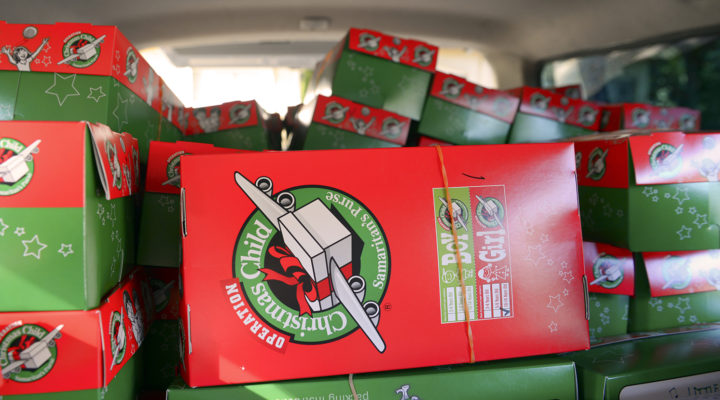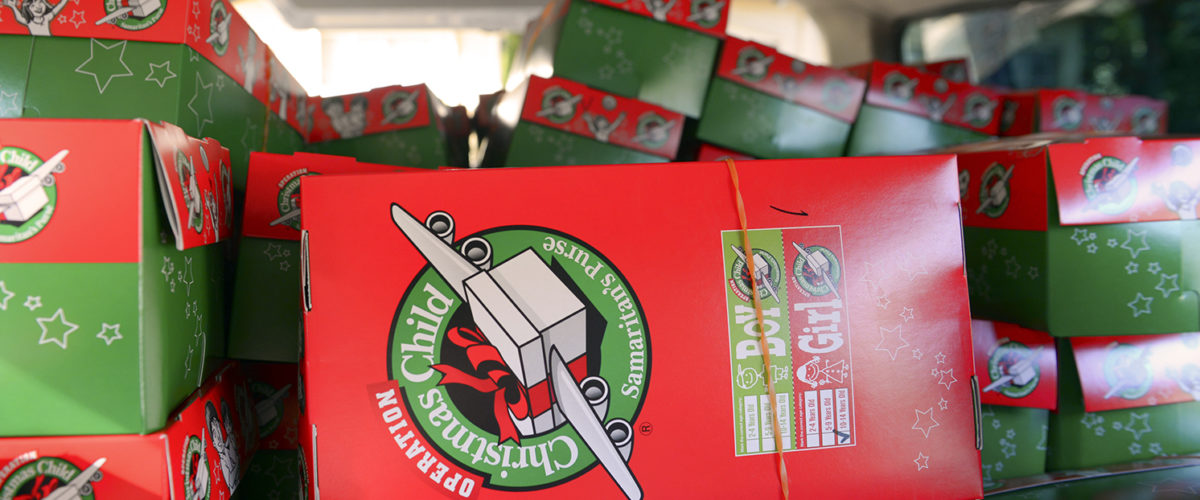On a balmy July afternoon in East Africa, Joelle McNamara stood with her African neighbors in puzzled anticipation. A shipment of shoeboxes from Operation Christmas Child had arrived for a cluster of local children. Families, pastors and McNamara herself gathered for the yuletide unveiling of toys, trinkets and other Christmas gifts that American churches had packed for the children.
As a young boy pried open his shoebox, a plastic Slinky emerged. He held it in front of his bewildered eyes as if to ponder all the ways that the colored spring could be fun or amusing. He had no clue.
Recognizing the boy’s confusion, a local pastor swooped in to provide aid and discover the proper use of a Slinky. Both pastor and child tinkered for a moment until they reached a verdict. Swinging it clumsily around his neck and fastening it under his chin, the pastor let out an amused chuckle at his new piece of American jewelry, courtesy of Operation Christmas Child.
“Yes, the result is a little bit comically terrible,” says McNamara, founder of the Kenya-based development organization Badala.
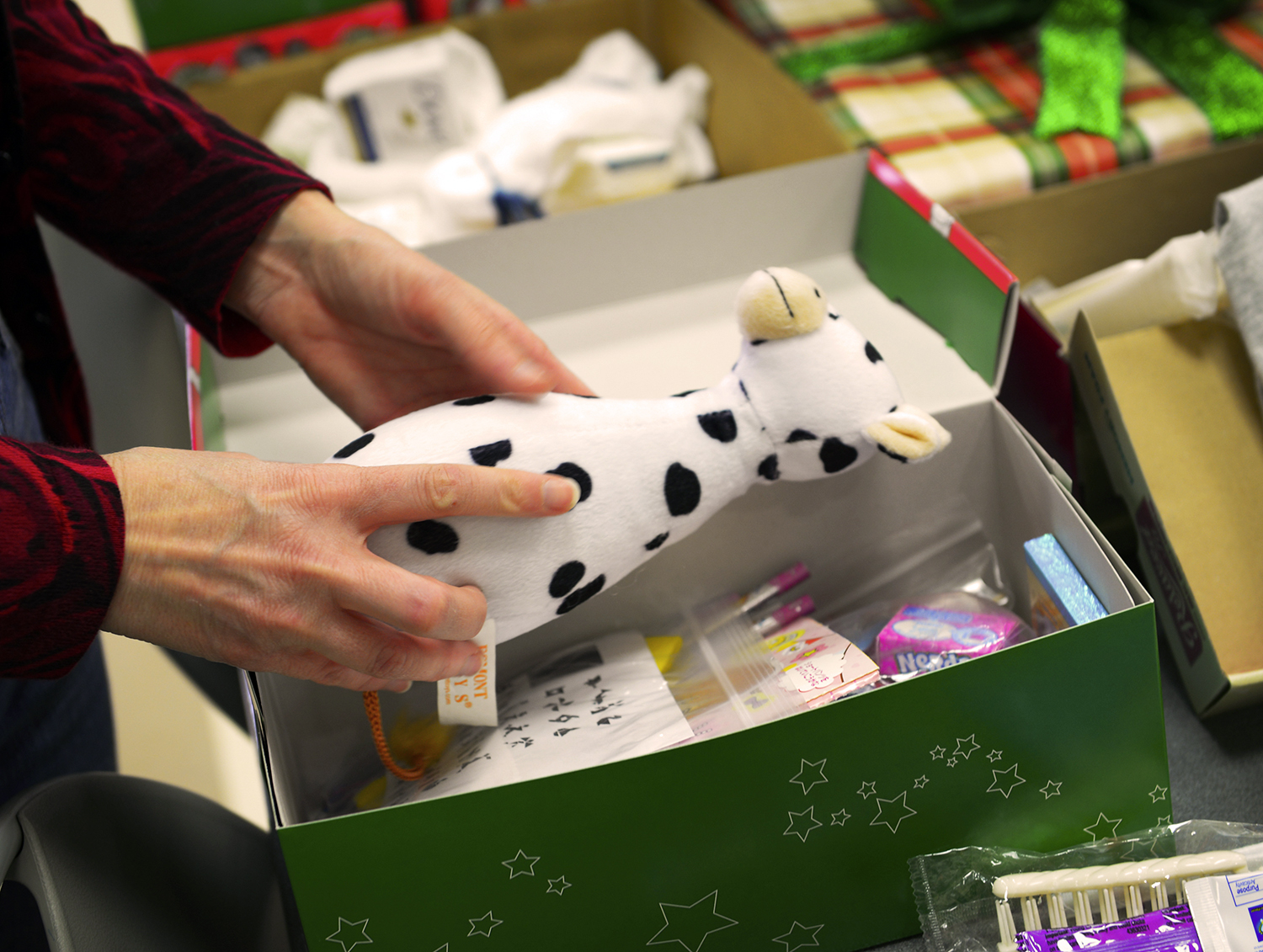
Drew Jernigan, coordinator for Yokota’s Operation Christmas Child initiative, packs a gift box at Yokota Air Base, Japan. Every year Jernigan and her daughter, Emma Grace, collect toys, school supplies, hygiene items and more to pack in shoe boxes and send to disadvantaged children all over the world. (Photo/U.S. Air Force/Airman 1st Class Elizabeth Baker/Wikipedia)
Since her first visit to East Africa as a teenager, McNamara says she has undergone a journey of understanding what God’s generosity can and must look like among those living in poverty. Her own dreams of feeding the poor and saving developing countries from poverty slowly fell apart as she encountered people who weren’t looking for food or toys, but rather sustainable employment and the means to utilize their own power and giftedness to support their families. The Samaritan’s Purse project Operation Christmas Child, an effort in which 500,000 volunteers invest each year, is a large-scale expression of generosity that has failed to listen and learn what truly gives life to people in need, she says.
“Being generous requires us to dedicate profound thought to what the person receiving our generosity actually needs,” McNamara says. “So often, the church makes generosity synonymous with the free giving of stuff, but it’s not. I’ve seen Westerners come in and drop off a whole bunch of stuff — toys, free food, tons of clothes. Typically it’s not useful, they’re paying way too much for overseas shipping and suddenly the local food or clothing vendors don’t make their living for the week, and those are important jobs for struggling communities.”
In East Africa, McNamara witnessed firsthand the ineffective and often toxic charity performed by many Western churches and aid organizations, including OCC. She subsequently founded Badala as a means for women across the world to sell their own handmade jewelry and housewares to support their families. If the church desires to help those living in poverty and share God’s love, she says, it must recognize a deeper “yes” as it says “no” to problematic and unjust forms of generosity like OCC.
“In terms of global poverty, give gifts that provide employment to people who can then provide Christmas for their own families,” McNamara says.
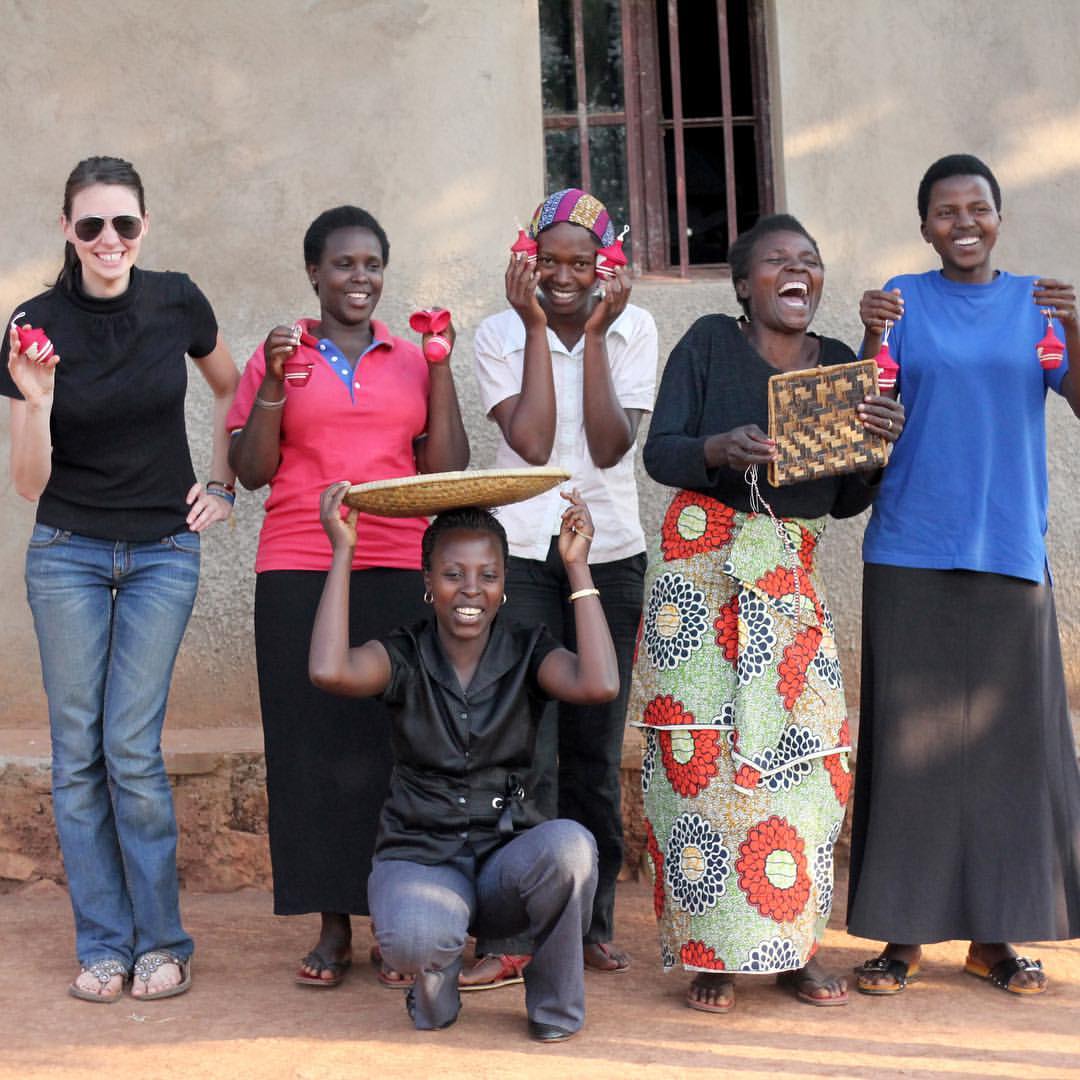
In East Africa, Joelle McNamara witnessed firsthand the ineffective and often toxic charity performed by many Western churches and aid organizations, including OCC. She subsequently founded Badala as a means for women across the world to sell their own handmade jewelry and housewares to support their families. (Photo/Badala FB page)
“We’re made in the image of a Creator, and when we provide someone the opportunity to create a product and a living, it’s so powerful and healing. I’ve seen so many switches go off as these women realize how they were made and that they are meant for more. It may sound insane to say that God’s love is experienced through employment, but it is. Give gifts that provide employment and invest in education — that is what gives power to people.”
Since charity workers David and Gill Cooke created Operation Christmas Child in 1990, the project has pervaded the local church and its allocation of mission resources. For many churches, both conservative and progressive, each November sees the gathering from entire congregations, children’s ministries, youth groups and individual donors to pack shoeboxes full of toys, school supplies, personal items and other small gifts to be shipped to children in need across the world.
Yet as those same congregations begin to explore and understand the fundamental flaws in even the most big-hearted giving of time and resources, they increasingly arrive at nuanced questions and conflicts about the nature of mission in the local church.
Sharlande Sledge, associate pastor of Lake Shore Baptist Church in Waco, Texas, says the church’s conflicted participation in OCC took a central place within their recent “compassionate conversations,” one of which led the church to welcome and affirm the LGBTQ community. On one hand, Sledge admits, OCC offers a highly tactile experience, especially for children and families as they gather to enjoy community as well as contribute to the mission of OCC. Participants not only enjoy the ease and joy of shopping for other children, but also channeling the thrilling benevolence with which many Americans give Christmas gifts.
In recent years, however, enthusiasm for OCC has waned at Lake Shore and congregants are seeking alternatives, Sledge says, not only as OCC’s relief efforts increasingly come under fire but as Samaritan’s Purse president Franklin Graham spews ever more hateful rhetoric about immigrants and Muslims.
“For more and more people in our church, the disconnect between the leader and the projects doesn’t make sense. In these chaotic times, we long for calm voices to guide us in purposeful mission with words and actions that reflect each other — two integrated parts of the whole. The gospel, as we understand it and try to practice it, is a gospel of welcome and justice, mercy and love. At Lake Shore, we never lack for good, creative opportunities to share our gifts. In this world of so many needs, we simply call on God’s wisdom to guide us toward just and compassionate choices.”
At First Baptist Church of Christ in Macon, Ga., those same conversations have led the congregation away from more toxic forms of charity toward creative opportunities to empower those living in poverty, says missions minister Jody Long. Thanks to the work of Cooperative Baptist Fellowship field personnel Angel and Jason Pittman, FBCC discovered and implemented a Christmas toy shop that provides local parents the opportunity to shop for their families at a greatly reduced cost and eliminates the shame that often accompanies free giving, Long says.
Each year at Christmas, FBCC holds a toy drive in which congregants and community members purchase new toys to donate to the toy shop. The church then marks down each toy by 85 to 90 percent so that families on low and fixed incomes can purchase gifts for their children. Long says the toy shop is not only a way to reject the ineffective and harmful practices of organizations like Samaritan’s Purse, but more importantly a way to build humanizing relationships and empower people with their own autonomy and income.
“It can dehumanize people when they’re always given everything,” Long says. “If we want to focus on providing Christmas gifts, we can at least allow people to access them with some sense of pride and buy-in to the system. We want to allow parents and families to participate in the process because there is a dignity that is gained by a parent being able to purchase their child’s gifts at Christmas as opposed to just another handout.”
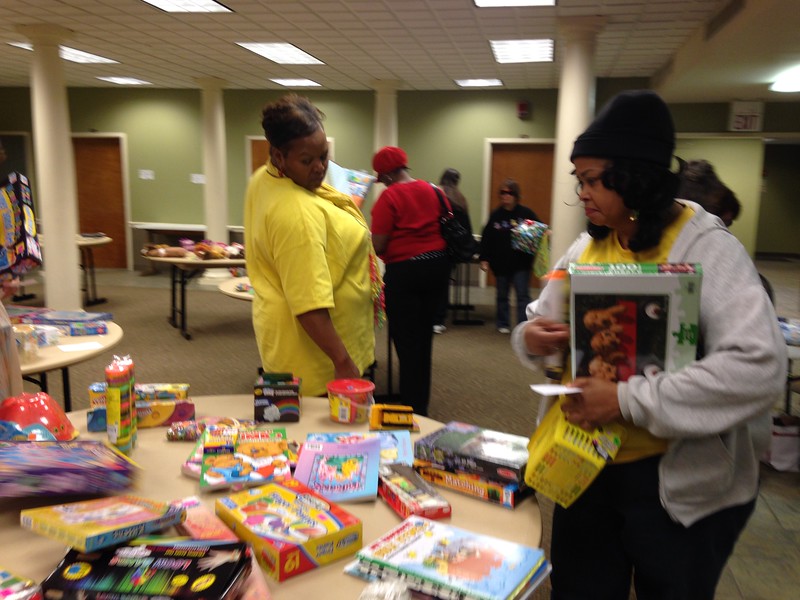
At First Baptist Church of Christ in Macon, Ga., those same conversations have led the congregation away from more toxic forms of charity toward creative opportunities to empower those living in poverty. FBCC implemented a Christmas toy shop that provides local parents the opportunity to shop for their families at a greatly reduced cost and eliminates the shame that often accompanies free giving. (Photo/FBCC)
Ultimately, as churches and faith communities undergo the delicate work of divesting from Operation Christmas Child and moving toward more effective development work, they quickly encounter the most deep-seated questions about the role of the church and how it engages with God’s mission.
Where do we go from here? How does the church offer real, sustainable aid to those living in poverty? Can congregations foster justice with financial giving alone or is full immersion required? What deeper work is God up to in the world and how can we join?
Melissa Browning, assistant professor of contextual ministry at Mercer University’s McAfee School of Theology, says that giving gifts, food or other goods through organizations like Operation Christmas Child is often an easy answer to the ways that global poverty tugs on one’s sense of compassion. Whether churches create their own projects, volunteer or simply give financial support to an organization or individual, the true goal is to foster real economic development and empower people to emerge from poverty, explains Browning, who also is consultant for Focused Community Strategies.
“Giving gifts is a very easy, cathartic answer and more often a way to ease our conscience than actually help someone with a development problem,” Browning says. “We can decide to buy a Christmas gift for a kid, and in that act of giving, we truly care about poverty and we care about another person’s situation. But as soon as we’ve wrapped that gift and sent it, we’re done and it doesn’t help them get out of poverty. If I give someone a bag of food or a Christmas gift, as soon as that bag of food or Christmas gift is gone, they’re still in the same situation. But when we begin to ask what better gift we can give instead, that’s where real development work comes in.”
No matter how a congregation engages its resources — full immersion or financial giving — creating good mission partnerships comes down to two questions, Browning says: does the cause or organization foster real economic development in the lives of people living in poverty and can they prove it? The best news, she adds, is that the church has diverse ways of participating in authentic economic development in poor communities, including direct giving.
In fact, atop GiveWell’s list of top-rated development organizations is GiveDirectly, a nonprofit organization that transfers cash to extremely low-income households in developing countries, where families and individuals are consistently proven to boost their own food security, education, living expenses and economic opportunities with the cash transfers. Sharing the list of highly vetted charities is a host of organizations working to fight malaria, the single greatest burden on the economy of African nations, according to the Against Malaria Foundation, as well as the Schistosomiasis Control Initiative, a deworming initiative working to fight soil-transmitted parasites.
If migrating from toxic charities like OCC means exploring economic development work in adjacent cities and neighborhoods, the church is almost guaranteed to find just and sustainable mission partnerships right around the corner, says Stephen Weir, executive director of Church Hill Activities and Tutoring. Since 2007, CHAT has invested in the youth in the East End of Richmond, Va., and equipped them with the education, support and relationships to emerge from poverty and destructive environments.
While the work of engaging children and families living in poverty may often sound romantic and even highly productive, Weir says, the church’s most vital task is to reconcile with the fact that engaging poverty will neither feel good nor produce big results.
“When you drop that Christmas present into the box at church, it feels really good, but when you really deal with the hard thing about poverty, it won’t. Your value comes when you begin to give the things that are harder to give, like sitting down with a kid who never learned how to read because his public school sucks. You can solve that by working with him, by starting a private school that works better or by working with the public schools to make them better, but that’s a long, hard process. You’re going to feel like you’re not making any progress and maybe you won’t, but you’ll finally be engaging poverty.”
In the end, when churches and faith communities reconcile with the fact that engaging poverty will be extremely difficult and possibly not produce any visible results, Weir says, they must finally be willing to leave their bubble, especially the one created by Operation Christmas Child and charity projects like it. If they can leave that bubble, Weir added, they can always find people and organizations that are truly engaging poverty and building relationships that empower communities in need.
Related opinion:
10 alternatives to Operation Christmas Child / Mark Wingfield
Want to be a good mission partner? 5 things to consider / Greg Jarrell
Franklin Graham: the apple that fell far from the tree / Robert P. Sellers
Franklin Graham, toxic charity concerns send churches packing from Operation Christmas Child

